
 Since its establishment in 1974, OJJDP has provided national leadership to support federal, state, tribal, and local efforts to prevent delinquency, strengthen the juvenile justice system, and protect children from violence, abuse, and exploitation. OJJDP is the only federal agency with a specific mission to develop and disseminate knowledge about what works in the juvenile justice field.
Since its establishment in 1974, OJJDP has provided national leadership to support federal, state, tribal, and local efforts to prevent delinquency, strengthen the juvenile justice system, and protect children from violence, abuse, and exploitation. OJJDP is the only federal agency with a specific mission to develop and disseminate knowledge about what works in the juvenile justice field.
In fiscal year (FY) 2018, OJJDP awarded approximately $300 million in grant funding to prevent juvenile delinquency and recidivism, address youth substance abuse, reduce gang violence, and support law enforcement investigations of cases involving children’s exposure to violence, exploitation, and crime. The awards were made through discretionary and formula grant funding.
OJJDP awarded approximately $257 million in discretionary grants in FY 2018. About $83 million was awarded to develop or enhance mentoring programs and services nationwide. Under its Mentoring Opportunities for Youth initiative, the Office awarded more than $77 million to 36 organizations in 21 states. This program supports the delivery of mentoring services to youth who are at high risk for juvenile delinquency and juvenile justice system involvement. This year, two categories of awards were specifically targeted to mentoring strategies for youth impacted by the opioid epidemic.
In further support of the Justice Department’s priority to combat the abuse of opioids and other drugs, OJJDP awarded more than $23 million to provide services to youth impacted by the opioid crisis, and to fund family and juvenile drug courts. The awards included more than $7 million under the Opioid-Affected Youth initiative, which provides assistance to states, local governments, and tribal jurisdictions in developing data-driven responses to opioid abuse. OJJDP awarded more than $12.9 million across 20 awards to 15 jurisdictions under its Drug Treatment Courts program. The program seeks to build the capacity of state, tribal, and local drug court programs for youth in the justice system with substance abuse problems, specifically those related to opioid abuse, as well as youth with co-occurring mental health disorders. Supplemental funding of $800,000 was awarded to continue operating the National Gang Center, which provides leadership, information, training, and technical assistance on comprehensive, community-based anti-gang initiatives.
OJJDP works to help youth who are reentering their communities after confinement to become law-abiding, contributing members of society. More than $13 million was awarded to support jurisdictions and provide funding to researchers to supplement reentry services for detained youth and incarcerated parents with children younger than 18. Most of the funding was awarded through OJJDP’s Second Chance Act Addressing the Needs of Incarcerated Parents With Minor Children program and the Office’s Second Chance Act Ensuring Public Safety and Improving Outcomes for Youth in Confinement and While Under Community Supervision program.
In FY 2018, OJJDP awarded more than $28 million to the National Center for Missing & Exploited Children. The center offers critical intervention and prevention services to families and supports law enforcement agencies at the federal, state, and local levels in cases involving missing and exploited children.
An additional $7 million funded initiatives to improve the response to child and youth trafficking victims; provide specialized services and mentoring for child victims of sex trafficking; and offer training and technical assistance to prosecutors, state and local law enforcement, child protection personnel, medical providers, and other child service professionals to strengthen the overall response to missing and exploited children’s issues, including child sex trafficking.
The Office awarded more than $29 million to support the Internet Crimes Against Children (ICAC) Task Force program. Of that amount, $23 million will fund the national network of 61 multiagency, multijurisdictional ICAC task forces. These task forces conduct forensic examinations and investigate and prosecute technology-facilitated child sexual exploitation throughout the United States.
The Department of Justice and OJJDP are committed to promoting positive youth development strategies that build on the traditions and cultural heritage of American Indian and Alaska Native communities. In FY 2018, OJJDP awarded more than $7.2 million to tribal initiatives to help youth address alcohol and drug abuse, stay out of the juvenile justice system, and gain life and leadership skills.
OJJDP’s Title II Formula Grants program helps states address juvenile delinquency and support improvements to the juvenile justice system. Formula grant funding also helps states address the core requirements of the Juvenile Justice and Delinquency Prevention Act. In FY 2018, Formula Grants program awards were announced for 48 states, the District of Columbia, and four territories. OJJDP awarded about $43 million through the Formula Grants program.
Resource:
For more information about the Office’s awards, visit OJJDP’s Funding webpage.
This article is the second in a series highlighting the work of four new programmatic divisions established under OJJDP’s October 2018 reorganization. The other programmatic divisions are Prevention, Special Victims and Violent Offenders, and State Relations and Assistance.
Juvenile delinquency and crime pose a significant challenge to the safety and well-being of communities nationwide. Charged by Congress to meet this challenge, OJJDP collaborates with professionals from diverse disciplines to foster juvenile justice interventions that hold youth accountable, deter future misconduct, and enhance the protective factors present in a young person’s life.
Led by Associate Administrator Kellie Blue, OJJDP’s Intervention Division manages grants that support diversion programs, drug treatment courts, opioid abuse services, community supervision, corrections, and reentry. Following are some highlights of the division’s work.
Combating Substance Abuse
OJJDP funds both juvenile and family drug courts, which use a treatment-oriented approach that emphasizes family engagement and addresses the substance abuse and often co-occurring mental health disorders that often are present in youth and families who come into contact with the juvenile justice system. OJJDP also supports training, technical assistance, and research to enhance the quality of services provided by drug courts. In addition, the Office is working with program sites to develop a data-driven and coordinated response to the opioid epidemic.
Strengthening the Juvenile Justice System
OJJDP develops and implements juvenile justice system improvements to reduce reoffending, improve youth outcomes, and increase public safety. Goals include reducing preadjudicatory detention and out-of-home placements and strengthening diversion and community-based alternatives. In addition, the Office supports the development of model tools and promising practices for the field based on lessons learned from OJJDP-funded programs. The Office also provides funding and other resources to help jurisdictions enhance juvenile defense delivery systems.
Promoting Safe and Successful Reentry
OJJDP supports the delivery of comprehensive reentry planning services to youth while they are still confined and during their reentry into the community. OJJDP funding addresses critical programmatic functions in day-to-day juvenile community supervision practices, including the use of a comprehensive risk and needs assessment, which takes into account the strengths and needs of youth as well as the risk for reoffending once back in the community. Other services support cognitive-behavioral interventions, permanency planning, staff training and development, and assistance to youth in overcoming the collateral consequences often associated with juvenile justice system involvement (e.g., barriers to higher education, employment, and housing).
Supporting the Children of Incarcerated Parents
OJJDP provides states and localities with funding to implement positive family engagement strategies and activities that address the needs of incarcerated parents and their minor children. Funding may also be used to provide opportunities for positive youth development and the identification of effective strategies and best practices that support the children of incarcerated parents.
Resources:
To access a chart that reflects OJJDP’s new structure following the recent reorganization, visit the Office’s website. To learn more about the Office’s State Relations and Assistance Division, read the September/October issue of OJJDP News @ a Glance. OJJDP will highlight other divisions in future issues of the newsletter.
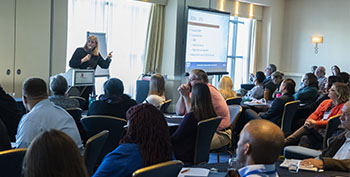 Administrator Harp addresses participants at an OJJDP training for juvenile justice specialists, compliance monitors, and disproportionate minority contact coordinators.
Administrator Harp addresses participants at an OJJDP training for juvenile justice specialists, compliance monitors, and disproportionate minority contact coordinators. OJJDP’s Formula Grants funds help states address juvenile delinquency and support improvements to the juvenile justice system. The funds also help states address the core requirements of the Juvenile Justice and Delinquency Prevention Act (deinstitutionalization of status offenders, separation of juveniles from adult inmates, and removal of juveniles from adult jails and lockups) as well as efforts designed to reduce DMC in the juvenile justice system.
Held in Baltimore, MD, the event featured preconference trainings with special tracks for new compliance monitors and juvenile justice specialists (staff with fewer than 3 years of job experience). Presentations included “Laying a Foundation: The Juvenile Justice and Delinquency Prevention Act, Title II, and OJJDP”; “Roles and Relationships: Juvenile Justice Specialists, Grantees, and States Advisory Groups”; “Voices From the Field: Question and Answer Session with Veteran Juvenile Justice Specialists”; “Dollars and Data: Grant Management and Reporting”; and “The First Three Core Requirements in Depth.”
—Meg Williams
Juvenile Justice Specialist, Colorado
On November 28–30, OJJDP staff provided more advanced training sessions on compliance monitoring and DMC. The compliance monitoring portion of the training included a presentation on OJJDP’s revised definitions of “detain” and “confine,” which allow law enforcement to hold youth who may be runaways, abandoned, or homeless until a safe place is found for them without these youth being considered “detained” or “confined.” In addition, OJJDP staff reviewed online data collection and reporting systems and discussed strategies for increasing the number of juvenile justice facilities that report data.
In her introductory remarks preceding the DMC portion of the training, Administrator Caren Harp shared information about OJJDP’s new outcome-based approach to DMC. Beginning in fiscal year 2019, the State Relations and Assistance Division will implement a streamlined Title II application process that will simplify DMC data collection requirements by reducing the number of contact points for which reporting is required from nine contact points to five. In addition, OJJDP will ask states to identify how they define success with their DMC reduction efforts and to evaluate the outcome of their DMC plans to assess what impact they had, if any, on disproportionality. The presentations that followed offered guidance on developing strategies to collect and report data, establishing an action plan to address DMC, and creating an outcome-based evaluation of DMC reduction efforts.
“The best part of this conference was meeting people who are doing the hard work of helping kids stay out of the court system, and for those who are in the court system, to find their way on to a better path,” Administrator Harp said. “It was such a privilege to come alongside them and help them with that, and I thank them for their dedication to this work.”
Resources:
Information about the fiscal year 2019 Formula Grants program is available on the OJJDP website.
For an overview of DMC and information about DMC funding and resources, visit the OJJDP website. OJJDP has included a DMC Databook in its Statistical Briefing Book. The DMC Databook enables users to review the processing of delinquency cases within the juvenile justice system.
Facts in Focus is a new OJJDP video series that highlights key juvenile justice developments and issues. In this first video, Dr. Sanzanna Dean, OJJDP Deputy Associate Administrator, discusses the agency’s toolkit Reentry Starts Here: A Guide for Youth in Long-Term Juvenile Corrections and Treatment Programs.
Every year, tens of thousands of youth return to their communities from residential placement, too often with no reentry plan. The resources provided in this guide speak to common barriers that youth may experience upon reentry. The guide includes specific actions youth can take to address those barriers with the help of a caring adult.
The guide is divided into two sections. Part one outlines steps youth can take to plan for reentry while they are in placement (e.g., build a reentry team, develop a plan with the team, get help from a supportive adult such as a parent or mentor, connect with support services, and plan ahead for school and work). Part two outlines steps youth can take to be successful upon return to their communities (e.g., use all available social and medical services, follow all probation order/parole agreement requirements and conditions, complete school, obtain employment, and manage money).
“We’ve gotten a lot of positive feedback from the field on this guide,” said Dr. Dean. “It’s the first comprehensive guide targeted to youth, to help them navigate the reentry process. The purpose of the guide is to encourage young people to begin thinking and planning for success at the earliest point possible while in placement.”
Resource:
OJJDP recently released a Juvenile Reentry Implementation Guide to provide information on implementing a reentry program. The user-friendly I-Guide features 10 steps for implementing a program as well as information on programs that offer comprehensive reentry efforts for youth.
 On October 31, 2018, President Donald Trump proclaimed November as National Native American Heritage Month. During November, communities and organizations across the nation honor the culture and contributions of American Indian and Alaska Native (AI/AN) people, and the Department of Justice renews its commitment to ensuring public safety in Indian country.
On October 31, 2018, President Donald Trump proclaimed November as National Native American Heritage Month. During November, communities and organizations across the nation honor the culture and contributions of American Indian and Alaska Native (AI/AN) people, and the Department of Justice renews its commitment to ensuring public safety in Indian country.
The Office of Justice Programs (OJP) observed Native American Heritage Month with a November 20 program titled “Violent Crime in Indian Country: Bureau of Indian Affairs (BIA) Law Enforcement and Victim Services.” In her keynote speech, Savannah Joe, a victim specialist for BIA’s Office of Justice Services and an enrolled member of the Diné Nation, described how law enforcement, prosecutorial offices, and crime victim specialists collectively work together to promote safety. OJJDP Administrator Caren Harp joined the directors of the Office for Victims of Crime and the Bureau of Justice Assistance in providing an overview of their offices’ work in tribal communities, including open solicitations, grants awarded, and how those grants will benefit Indian country.
For decades, OJJDP has honored its commitment through programs and training and technical assistance that prevent crime and promote positive life outcomes among tribal youth. Following are highlights of OJJDP’s current work:
- The Tribal Youth Program supports tribal governments in preventing juvenile delinquency and responding effectively to youth in the juvenile justice system. The program includes prevention services (e.g., youth gun violence reduction programs, school dropout prevention programs, afterschool programs); interventions for court-involved tribal youth (e.g., graduated sanctions, restitution, diversion); improvements to the tribal juvenile justice system (e.g., indigenous justice strategies, tribal youth courts, advocacy programs); and substance abuse prevention and mental health services.
- Tribal Juvenile Healing to Wellness Courts enhance the capacity of tribal courts to respond to substance abuse-related issues of youth younger than 21. The courts bring together community healing resources with the tribal justice process, using a team approach to achieve the physical and spiritual healing of the participant and the well-being of the community.
- The OJJDP Tribal Youth Training and Technical Assistance Center provides comprehensive training and technical assistance for OJJDP tribal grantees. The center works with grantees through a strategic planning process and offers ongoing support throughout the course of their grant program. All tribes, regardless of whether they are funded by OJJDP, are eligible to participate in an array of trainings, webinars, and online virtual simulation trainings.
- The National Intertribal Youth Leadership Development Initiative aims to enhance tribal efforts to increase youth engagement, coordination, and action related to juvenile justice, delinquency prevention, and public safety in Indian country. The initiative supports regional learning events for tribal youth focused on developing leadership skills.
- Mentoring programs through the Mentoring Opportunities for Youth Initiative promote positive behaviors
and reduce risk factors associated with delinquency and juvenile justice system involvement, such as poor school attendance, school failure, and alcohol and drug abuse. OJJDP created a category in the fiscal year 2018 Mentoring Opportunities for Youth solicitation specifically identifying tribes as eligible for $1.25 million each to support mentoring services for youth impacted by opioids.
Resources:
On September 26, 2018, Administrator Caren Harp participated in a hearing of the Senate Indian Affairs Committee on the Government Accountability Office report Native American Youth: Involvement in Justice Systems and Information on Grants to Help Address Juvenile Delinquency. Read Administrator Harp’s testimony.
To learn more about OJJDP’s tribal initiatives, visit the Office’s website.
 Will Bronson, OJJDP Deputy Associate Administrator and Operations Manager.
Will Bronson, OJJDP Deputy Associate Administrator and Operations Manager.“A major part of our work is budget development and execution, both our program budget for OJJDP grants and interagency agreements, and the operations budget, which supports staff travel, training, and OJJDP contracts,” said Will. “In addition, OJJDP’s performance measurement system tracks the progress of Office-funded programs to ensure that those programs meet specific goals, objectives, and outcomes. But we’re also responsible for the day-to-day operations of OJJDP, and my staff works tirelessly in this area as well—correspondence, time and attendance, space assignment, work order submissions, and workforce management.”
Recently, Will was one of two staff members in the Office of Justice Programs (OJP) selected for OJP-sponsored participation in the Senior Executive Fellows Program at the Harvard Kennedy School. The program is a 4-week in-residence professional development program for public-sector executives who wish to sharpen their leadership and managerial skills. “I’m deeply grateful to OJP for giving me this opportunity to broaden my skills and experience,” said Will.
Raised in Chesapeake, VA, Will has been with OJJDP since 2009. Before joining OJJDP, Will worked as the Director of Operations for VA Pyxis, Inc., a private human services agency that provides therapeutic treatment services to child-serving agencies throughout Virginia. In addition to his experience in the private sector, Will has more than 10 years of experience in state government working as a juvenile probation officer and then as a program administrator in Virginia.
Will received his bachelor’s degree in applied sociology and history from Old Dominion University, a master’s degree in project management from Regis University, and a master’s degree in business administration from the University of Phoenix (Richmond, VA).
An estimated 1.7 million youth younger than age 18 have at least one parent currently in prison in the United States, and millions more have a parent currently in jail. Incarcerated parents and their children are a diverse group, and associations between parental incarceration and developmental outcomes are complicated. Research has shown that having an incarcerated parent can present individual and environmental risks for the child and increase the likelihood of negative outcomes.
OJJDP awarded grants to a practitioner-researcher partnership to develop and evaluate new mentoring practices that serve the needs of youth whose biological parent, legal guardian, or informal primary caregiver is incarcerated in a prison or jail. The study regarding the effectiveness of the mentoring practices is ongoing; however, the research team has collected detailed information about a large sample (1,350 children) from states across the country whose parents are incarcerated.
Because there is no national survey of children with incarcerated parents, this large sample is increasing the juvenile justice field’s understanding of the unique strengths and needs of this population. Following are highlights of the current data:
- Fourteen percent of the children did not know about their parent’s incarceration.
- Twenty-four percent of the children have had more than one incarcerated caregiver at some point in their lifetime.
- Although fathers comprise the majority of incarcerated parents, mothers and other caregivers (such as aunts and uncles, a parent’s partner, and grandparents who serve as caregivers) are also incarcerated.
- The majority of the sample experienced risk factors in addition to having an incarcerated parent (e.g., school discipline problems, delinquency, antisocial peers, social exclusion, and/or a parent in poor health).
- The youth in the survey also had a diverse array of protective factors (e.g., afterschool activities such as sports, music, or theater; religious or spiritual involvement; a caring family or adult community; a supportive nonparental adult; and/or stable access to the Internet).
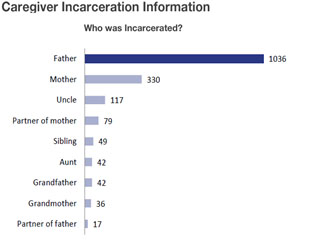 Stump, K.N., Stelter, R.L., Kupersmidt, J.B., and Rhodes, J.E. 2018. Mentoring Children of Incarcerated Parents Demonstration Project: August 2018 Data Update for Mentee Characteristics.
Stump, K.N., Stelter, R.L., Kupersmidt, J.B., and Rhodes, J.E. 2018. Mentoring Children of Incarcerated Parents Demonstration Project: August 2018 Data Update for Mentee Characteristics.These and other data from the survey and forthcoming findings on mentoring practices will provide important insight into strategies for fostering positive family engagement between incarcerated parents and their children, as well as best practices for prevention and intervention programs targeted to the unique needs of this population.
Resource:
For more information about the Mentoring Children of Incarcerated Parents Demonstration Project, visit the OJJDP website.
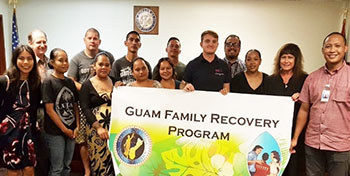 The Guam Family Recovery Program team (shown above) consists of attorneys, therapeutic services providers, and staff of the Judiciary of Guam and Child Protective Services.
The Guam Family Recovery Program team (shown above) consists of attorneys, therapeutic services providers, and staff of the Judiciary of Guam and Child Protective Services.
Photo courtesy of Guam Family Recovery Program.
By Guam Family Recovery Program Team, Judiciary of Guam
On November 15, 2017, the Judiciary of Guam launched the island’s first family drug treatment court, known as the Guam Family Recovery Program (GFRP). Before GFRP was established, there were no court programs that specifically addressed the needs of families affected by substance abuse. Through a cooperative agreement with OJJDP, the Judiciary of Guam obtained funding to address parental substance abuse that threatens the safety and permanency of children.
GFRP’s mission is to improve the health, safety, and welfare of children and to support parents in their recovery from substance abuse through increased judicial oversight and improved access to individualized treatment services. Our program seeks to strengthen families by providing collaborative, culturally respectful, family-centered treatment and services. Our goal is to address parental substance abuse and recovery for successful family reunification.
Through funding from the cooperative agreement and guidance from the technical assistance provider, the Center for Children and Family Futures, we were able to secure residential treatment for the parents. GFRP team members had the opportunity to attend the National Association of Drug Court Professionals annual conference in Washington, DC, and Houston, TX, and to visit existing family drug treatment courts.
Since GFRP launched, referrals received by the team have increased steadily, and we anticipate continuous growth in the coming years. Currently, there are 10 parents and their families, including 32 children, who have received assistance and support.
When the Judiciary of Guam committed to establishing GFRP, we met this challenge with an expectation that it could positively change how our justice system stems the tide of addiction. Since our first staffing and review hearing, we’ve been impressed that each stakeholder has been engaged, collaborative, and shared the same expectation.
With a culture rooted in family, GFRP continues to use this premise as the core of our work, and it has yielded great results. In the first 13 months of the program, and with close supervision from our GFRP team, we have witnessed a significant transformation in the parents’ behavior. Parents are holding themselves accountable and are committed to working toward the goal of sobriety and reunification with their children. We are well aware that there are bumps in the road toward recovery; however, the collaborative stakeholders that make up the team continue to provide great input that further strengthens our GFRP.
Our parents’ stories have often brought tears to our eyes, sometimes for the hard reality of relapse, and others for the successes achieved in living a substance-free life. Recently, GFRP held a surprise baby shower for a parent in the program in celebration of maintaining her sobriety. All GFRP parents voluntarily participated by bringing food, gifts, and assisting with decorating. The first GFRP substance-free baby was born on September 12, 2018.
GFRP is just starting this great journey to change the perspective of the community on addiction and recovery involving children and families. Like all new programs, GFRP has experienced its share of growing pains. Many of the initiatives we introduced and implemented were foreign to us and our partners; however, with the shared goal of reunifying families, we have continued to move forward, and our first parents graduated from the program in November 2018. We expect more challenges moving forward, but are confident that the GFRP model works.
Child Homicide Investigations: January 26–27, 2019
The OJJDP-sponsored National Criminal Justice Training Center will hold this training in San Diego, CA. It will focus on understanding and building relationships between forensic pathologists, homicide investigators, and prosecutors to successfully investigate and prosecute child homicide cases. The training is designed for prosecutors as well as court system, law enforcement, social work, and victim service professionals. Registration information is available online.
 National Mentoring Summit: January 30–February 1, 2019
National Mentoring Summit: January 30–February 1, 2019
The ninth annual National Mentoring Summit will take place in Washington, DC. Organized by MENTOR: The National Mentoring Partnership and supported by OJJDP, the summit will feature more than 80 workshops that showcase exemplary program models, collaborations, research, and innovations that have positive implications for strengthening the mentoring field. The summit is the only national convening of youth mentoring professionals, researchers, philanthropic investors, and government and civic leaders aimed at collectively strengthening and expanding quality mentoring relationships for young people across the country. OJJDP hosts an annual new grantee orientation prior to the summit to train new grantees on federal grants management requirements and best practice standards based on the evidence-based guide, Elements of Effective Practice for Mentoring. Registration information is available online.
Forensic Interviewing of Children: February 11–15, 2019
Sponsored by the National Children’s Advocacy Center (NCAC), this training is intended for professionals with less than 2 years of experience conducting forensic interviews of children, experienced child abuse professionals seeking to sharpen existing skills, and professionals who want to learn about the current NCAC Child Forensic Interview Structure. The course will be held in Huntsville, AL. Registration information is available online.
 The training will also be offered on the following dates (in Huntsville) in 2019: April 8–12, June 10–14, July 22–26, September 16–20, October 21–25, November 4–8, and December 9–13.
The training will also be offered on the following dates (in Huntsville) in 2019: April 8–12, June 10–14, July 22–26, September 16–20, October 21–25, November 4–8, and December 9–13.
United National Indian Tribal Youth Midyear Conference: February 15–18, 2019
The United National Indian Tribal Youth (UNITY) conference will be held in Scottsdale, AZ. The event will include youth leadership development activities, training for youth leader advisors, networking, cultural exchange, and an education and career fair. In addition, youth leaders will provide feedback to help shape content for the annual national conference scheduled to take place in summer 2019. UNITY's mission is to foster the spiritual, mental, physical, and social development of American Indian and Alaska Native youth. Registration information is available online.
Criminal Connections: Child Pornography and Child Sexual Abuse: February 25–26, 2019
Many offenders who sexually abuse children also possess child pornography. In 2012, more than 80 percent of men arrested for child sexual abuse were in possession of child pornography. During this training, sponsored by the National Criminal Justice Training Center, participants will learn about the additional trauma victims experience when child pornography is involved. The training, to be held in Bellingham, WA, will explore investigative strategies that address the relationship between child sexual abuse and child pornography to supplement an investigation and corroborate victim statements. Registration information is available online.
Victim Advocacy Training: February 26–28, 2019
This training, sponsored by the National Children’s Advocacy Center, is designed for victim advocates who work with children and families in a Child Advocacy Center setting. While focusing on the work and support provided by advocates, this course also includes sessions on trauma, grief, and secondary trauma. The training will be held in Huntsville, AL. Registration information is available online.
The course will also be offered on the following dates (in Huntsville) in 2019: August 27–29 and October 1–3.
Sexual Offenses: Mind and Motivation: February 27–28, 2019
Sponsored by the National Criminal Justice Training Center, this training will offer an introduction into the psychology of those who commit sexually motivated crimes. Participants will learn about sex offender typologies and patterns of behavior, and will analyze actual case examples to gain insight into offenders’ motivations and methods. This knowledge can be applied during interviews and interrogations to help resolve cases of sexually motivated crimes. Registration information is available online.
2019 Conference on Juvenile Justice: March 17–20, 2019
Sponsored by the National Council of Juvenile and Family Court Judges, this conference will explore gaps in services, new and improved practices, and cutting-edge research. Featured topics will include crossover youth, deep-end youth, teen dating violence, solitary confinement, domestic sex trafficking of minors, racial and ethnic disparity, child development, mental health, and juvenile and family drug treatment courts. The conference will take place in Las Vegas, NV. Registration information is available online.National Summit on Youth Homelessness: March 18–19, 2019
 The National Network for Youth (NN4Y) will hold its sixth annual summit in Washington, DC. This event focuses on how government agencies, policymakers, young leaders, service providers, and other experts can collaborate to prevent and respond to youth homelessness. Sessions will include discussions of practices, resources, and strategies that are relevant to participants’ work in preventing and responding to youth homelessness. During the summit, NN4Y will facilitate a discussion among federal agencies regarding their work to address youth homelessness. Registration information is available online.
The National Network for Youth (NN4Y) will hold its sixth annual summit in Washington, DC. This event focuses on how government agencies, policymakers, young leaders, service providers, and other experts can collaborate to prevent and respond to youth homelessness. Sessions will include discussions of practices, resources, and strategies that are relevant to participants’ work in preventing and responding to youth homelessness. During the summit, NN4Y will facilitate a discussion among federal agencies regarding their work to address youth homelessness. Registration information is available online.
35th International Symposium on Child Abuse: March 18–21, 2019
 This event will feature more than 160 workshops in 12 topic areas: administration, child protective services, forensic interviewing, human trafficking/sexual exploitation, law enforcement, medical issues, mental health and mental health treatment, prevention, prosecution, secondary traumatic stress, victim advocacy, and youth-serving organizations. Sponsored by the National Children’s Advocacy Center, the symposium will address all aspects of child maltreatment, including physical abuse, sexual abuse, neglect, exposure to violence, polyvictimization, exploitation, intervention, trafficking, and prevention. The symposium will be held in Huntsville, AL. Registration information is available online.
This event will feature more than 160 workshops in 12 topic areas: administration, child protective services, forensic interviewing, human trafficking/sexual exploitation, law enforcement, medical issues, mental health and mental health treatment, prevention, prosecution, secondary traumatic stress, victim advocacy, and youth-serving organizations. Sponsored by the National Children’s Advocacy Center, the symposium will address all aspects of child maltreatment, including physical abuse, sexual abuse, neglect, exposure to violence, polyvictimization, exploitation, intervention, trafficking, and prevention. The symposium will be held in Huntsville, AL. Registration information is available online.
Senior Policy Advisor Moderates Panel on Child Sex Trafficking at Police Conference
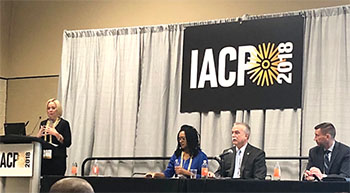 OJJDP Senior Policy Advisor Cynthia Pappas presents during a session on child victims of sex trafficking. She was joined by Cherice Hopkins, a staff attorney at Rights4Girls; Captain Kent Wegener of the Los Angeles County Sheriff’s Department Human Trafficking Bureau; and Captain Derek Prestridge of the Texas Department of Public Safety.
OJJDP Senior Policy Advisor Cynthia Pappas presents during a session on child victims of sex trafficking. She was joined by Cherice Hopkins, a staff attorney at Rights4Girls; Captain Kent Wegener of the Los Angeles County Sheriff’s Department Human Trafficking Bureau; and Captain Derek Prestridge of the Texas Department of Public Safety.The workshop gave law enforcement executives an opportunity to learn about key antitrafficking laws as well as local efforts to help front-line officers better identify, investigate, and respond to child sex trafficking victims. This session highlighted how federal, state, and local agencies are addressing the needs of child sex trafficking victims through advocacy partnerships and innovative policies and practices.
OJJDP Observes National Runaway Prevention Month
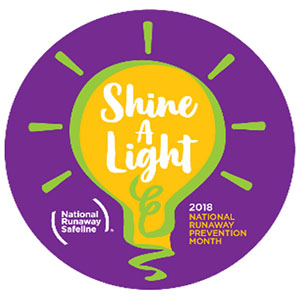 The National Runaway Safeline serves as the federally designated national communication system for runaway and homeless youth. The Safeline has a database of more than 9,000 resources to connect youth and concerned parents to local support.
The National Runaway Safeline serves as the federally designated national communication system for runaway and homeless youth. The Safeline has a database of more than 9,000 resources to connect youth and concerned parents to local support.OJJDP worked with the Bureau of Justice Statistics to collect information directly from youth by adding several questions on youth living arrangements to the National Survey of Youth in Custody. OJJDP anticipates that this information will provide a valuable snapshot of the living arrangements of youth who are entering the juvenile justice system. Through the use of individualized assessments along with reentry and transition planning geared to individual needs, facilities will be able to provide more effective support in transitioning youth to safe and stable housing once they are released from the juvenile justice system.
OJJDP recently published a juvenile reentry toolkit that includes guidance on identifying and addressing a youth’s housing needs as part of the transition planning process. For more information on the toolkit, see the article titled “Facts in Focus: OJJDP’s Reentry Guide for Youth” in this issue of the newsletter.
To access OJJDP's In Focus page on runaway and homeless youth, visit the Office’s website. For information on the National Network for Youth’s 2019 Summit on Youth Homelessness, see the Upcoming Events section of the newsletter.
OJJDP’s Mentoring Resource Center Launches “Reflections on Research” Podcast Series
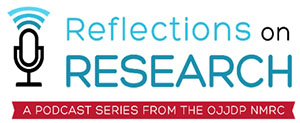 OJJDP’s National Mentoring Resource Center has launched a Reflections on Research podcast series that offers information about the latest research for practitioners, policymakers, and leaders in youth mentoring, along with the practical applications of new research to their work.
OJJDP’s National Mentoring Resource Center has launched a Reflections on Research podcast series that offers information about the latest research for practitioners, policymakers, and leaders in youth mentoring, along with the practical applications of new research to their work.
Participants will hear directly from the research community as leading scholars discuss their findings and the implications of their work. Each interview examines one or more studies and will help those in the mentoring field understand the key details and main points from complex research projects.
To access the podcasts, visit the National Mentoring Resource Center website.
Grantees Gather for National Tribal Youth Conference
The OJJDP Tribal Youth Training and Technical Assistance Center held its 2018 National Tribal Youth Conference on December 3–4, with the theme "Reclaiming the Sacred Circle: Justice and Healing for Tribal Youth through Prevention, Intervention, and Treatment." The event took place on the reservation of the Agua Caliente Band of Cahuilla Indians in California. The meeting is a national gathering of OJJDP Tribal Youth Program and Juvenile Healing to Wellness Court grantees and other intervention, prevention, and court-based programs serving tribal youth. The conference was coordinated by the Indian Country Child Trauma Center through a cooperative agreement with OJJDP. The multi-track event gave participants the opportunity to engage with experts in the field of tribal juvenile justice and learn about strategies to support and promote safety in tribal communities.
Application Period for Tribal Youth Grants Now Open
On November 30, 2018, the Department of Justice announced the opening of the grant solicitation period for the fiscal year 2019 Coordinated Tribal Assistance Solicitation (CTAS). Included among the solicitation’s 10 purpose areas are OJJDP’s Juvenile Tribal Healing to Wellness Courts and OJJDP’s Tribal Youth Program.
Applications for CTAS are submitted online through the Department’s Grants Management System (GMS). Applicants must register with GMS before submitting an application. The application deadline is 9 p.m. EDT, February 26, 2019. Fact sheets detailing each of the individual purpose areas can be found online. Webinars to guide applicants through the CTAS application requirements are scheduled for December 13, December 18, and December 20. Registration information for the webinars is available online.
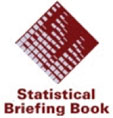 OJJDP Adds Court Data to Statistical Briefing Book
OJJDP Adds Court Data to Statistical Briefing Book
OJJDP has updated its Statistical Briefing Book to include national estimates of delinquency and petitioned status offense cases processed in juvenile courts through 2016.
Resources include:
- A Data Snapshot describing the characteristics and processing outcomes of delinquency cases handled in juvenile court in 2016.
- Data Analysis and Dissemination Tools, including: Easy Access to Juvenile Court Statistics and Easy Access to State and County Juvenile Court Case Counts.
- Frequently Asked Questions about Juveniles in Court and Juveniles on Probation.
- A Special Topics section, including detailed tables that describe delinquency cases involving Hispanic youth.
Developed for OJJDP by the National Center for Juvenile Justice, the research division of the National Council of Juvenile and Family Court Judges, the Statistical Briefing Book offers easy online access to statistics on a variety of juvenile justice topics.
Model Data Project Supports Enhancement of Data Use by Juvenile Justice Practitioners
The OJJDP Juvenile Justice Model Data Project aims to improve the quality and consistency of juvenile justice information and increase its appropriate use in policy and practice decisions by providing guidance to states and jurisdictions on data improvements.The project has produced a range of guidance materials, including a series of “3D Data Capacity Assessments” that help juvenile justice practitioners examine the data capacity of their juvenile justice system and reflect on their own use of data to inform decisions and drive improvements. The assessments cover infrastructure (the extent to which an agency and juvenile justice system have the underlying technology, leadership, strategic plans, and staff skills necessary to support data-informed practices); data use and dissemination (the extent to which policies and practices promote both the sharing of information and the application of information to decisions); and indicators of juvenile justice system involvement (the extent to which data elements are available to apply model measures of juvenile justice system involvement recommended by the Juvenile Justice Model Data Project).
In addition, the project has issued four briefs designed to enhance data use by juvenile court judges, juvenile correctional administrators, juvenile probation administrators, and law enforcement agencies.
Entries Sought for 2019 National Missing Children’s Day Poster Contest
With an annual theme of “Bringing Our Missing Children Home Safely,” each year OJJDP invites fifth graders to participate in the Missing Children’s Day poster contest. The annual contest creates an opportunity for schools, law enforcement, and child advocates to discuss the issue of missing and exploited children with youth, parents, and guardians and to promote child safety.
Each state hosts its own poster competition, and the winning poster from each state is submitted to OJJDP in a contest to select the national winner. OJJDP invites the child who designed the winning poster, his or her teacher and parents, and the state clearinghouse manager to Washington, DC, to participate in the National Missing Children’s Day commemoration in May.
The winning poster serves as the inspiration for the National Missing Children's Day poster and artwork for the following year. View the gallery of posters from previous years. Prospective participants should check with their state contest manager for the submission deadline. The national deadline for states to submit their winning poster is March 5, 2019. The National Missing Children's Day ceremony will be held on May 22, 2019. Contest rules, contact information for state contest managers, discussion materials, and additional information are available in the contest packet.
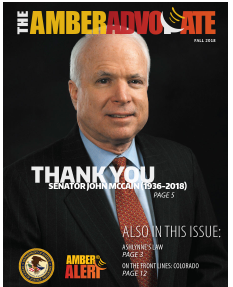 Fall 2018 Issue of The AMBER Advocate Available
Fall 2018 Issue of The AMBER Advocate Available
The AMBER Alert Training and Technical Assistance Center has released the fall 2018 issue of The AMBER Advocate. The top story describes how the Ashlynne Mike AMBER Alert in Indian Country Act of 2018 is currently being implemented to increase law enforcement coordination as well as create new and expanded resources to protect children living on tribal lands. The legislation was introduced by the late Senator John McCain (R–AZ).
In addition, the issue offers profiles of the Michigan State AMBER Alert Coordinator and Michigan’s Missing Person Clearinghouse Manager, and an article about how a Colorado AMBER Alert brought an abducted child home safely. The AMBER Advocate is produced through a cooperative agreement with OJJDP.
Juvenile Court Statistics 2016 Released
The National Center for Juvenile Justice has released Juvenile Court Statistics 2016. The report draws on data from the OJJDP-funded National Juvenile Court Data Archive, describes delinquency cases and petitioned status offense cases that courts with juvenile jurisdiction processed in 2016, and presents trends since 2005. In 2016, courts with juvenile jurisdiction handled an estimated 850,500 delinquency cases and an estimated 94,700 petitioned status offense cases. See OJJDP's Statistical Briefing Book for additional information on juvenile court case processing.
All OJJDP publications may be viewed and downloaded on the publications section of the OJJDP website. Print publications may be ordered online at the National Criminal Justice Reference Service website.
Coming Soon—
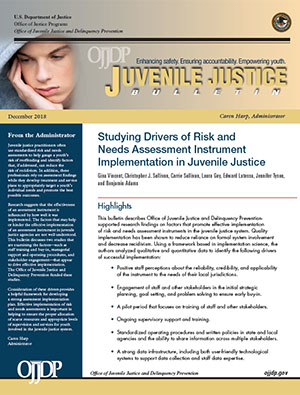 Studying Drivers of Risk and Needs Assessment Instrument Implementation in Juvenile Justice
(Bulletin)
Studying Drivers of Risk and Needs Assessment Instrument Implementation in Juvenile Justice
(Bulletin)
Juvenile justice practitioners often use risk and needs instruments to assess a youth’s risk of reoffending and identify factors that, if addressed, can reduce the risk of recidivism. In addition, these professionals rely on assessment findings to develop a treatment and service plan that will appropriately target a youth’s individual needs and promote the best possible outcomes. Research suggests that the effectiveness of an assessment instrument is influenced by how well it is implemented. This bulletin examines two OJJDP-supported studies that examine the factors—such as staff training and buy-in, managerial support, and stakeholder engagement—that appear to drive effective implementation.
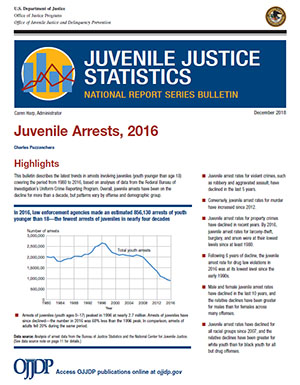 Juvenile Arrests, 2016
(Bulletin)
Juvenile Arrests, 2016
(Bulletin)
This bulletin describes the latest trends in arrests involving juveniles (youth younger than age 18) from 1980 to 2016, based on analyses of data from the Federal Bureau of Investigation’s Uniform Crime Reporting Program. Overall, juvenile arrests have been on the decline for more than a decade; however, patterns vary by offense and demographic group. Juvenile arrest rates for violent crimes, such as robbery and aggravated assault, have declined in the past 5 years. Conversely, juvenile arrest rates for murder have increased since 2012. Property crimes have declined in recent years and by 2016, the juvenile arrest rates for larceny-theft, burglary, and arson were at their lowest levels since at least 1980. Following 6 years of decline, the juvenile arrest rate for drug law violations in 2016 was at its lowest level since the early 1990s.

On December 19, 2018, OJJDP hosted a public meeting of the Coordinating Council on Juvenile Justice and Delinquency Prevention from 10 a.m. to noon. The meeting featured reports on current juvenile-justice related activities by the Council’s member agency representatives and practitioner members. A representative from the Department of Health and Human Services’ Family and Youth Services Bureau presented on initiatives to address runaway and homeless youth and other at-risk youth. In addition, a representative from the Bureau of Indian Affairs presented on the agency’s programs to promote alternatives to detention, restorative juvenile justice practices, and improved relationships between law enforcement and youth in Indian country. A summary of the meeting will be made available on the Coordinating Council’s website.
A summary of the meeting will be made available on the Coordinating Council’s website.
The Coordinating Council on Juvenile Justice and Delinquency Prevention is an independent body within the executive branch of the federal government operated under the Federal Advisory Committee Act. The council's primary functions are to coordinate federal juvenile delinquency prevention programs, federal programs and activities that detain or care for unaccompanied juveniles, and federal programs relating to missing and exploited children.
The council is made up of 22 members—13 ex officio and affiliate members and 9 practitioners. The ex officio members are: the Attorney General; the Administrator of the Office of Juvenile Justice and Delinquency Prevention; the Secretaries of the U.S. Departments of Education, Health and Human Services (HHS), Housing and Urban Development, and Labor; the Assistant Secretary of Immigration and Customs Enforcement in the U.S. Department of Homeland Security; the Director of the Office of National Drug Control Policy; and the Chief Executive Officer of the Corporation for National and Community Service. Affiliate members are the Secretaries of the U.S. Departments of Agriculture, Defense, and the Interior, and the Administrator of the Substance Abuse and Mental Health Services Administration of HHS. The nine juvenile justice practitioner members are appointed by the Speaker of the House of Representatives, the Senate Majority Leader, and the President of the United States.